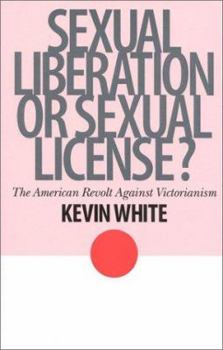Sexual Liberation or Sexual License?: The American Revolt Against Victorianism
(Part of the American Ways Series Series)
Select Format
Select Condition 
Book Overview
The century-long struggle over the boundaries of sexual propriety and morality is the subject of Kevin White's rich account of American attitudes toward sex. Mr. White explores this great and continuing cultural conflict in the full context of Americans' ambiguous dialogue with their Victorian legacy. Incisive and authoritative....A remarkably nuanced analysis of Americans' obsession with sex. --John C. Burnham, Ohio State University. A bold and engaging survey...highly readable. --William L. O'Neill. American Ways Series.
Format:Hardcover
Language:English
ISBN:1566633052
ISBN13:9781566633055
Release Date:June 2000
Publisher:Ivan R. Dee Publisher
Length:160 Pages
Weight:0.96 lbs.
Dimensions:1.0" x 5.6" x 8.5"
Customer Reviews
2 ratings
useful for classes
Published by Thriftbooks.com User , 19 years ago
Very useful for my sociology classes on sexuality and popular culture. A concise, reasonably thorough, readable,historical survey.
Better than advertised here.
Published by Thriftbooks.com User , 21 years ago
For those who can't fathom that the change in sexual mores over the past century has been something far short of an unmitigated good thing, or for those without the courage to question the evidence on their side of this bitter debate, then this book is going to be a hard read. Defense mechanisms, such as belittling the author for stating what they think is obvious (references to Hugh Hefner, Jerry Lee Lewis, Mae West, etc.) and ad hominem attacks for daring to quote Robert Bork, overlook the fact that despite the multiple references to the influence of pop culture, White has a deeper analysis for the causes of how America moved away from the Victorian culture. He also questions how much America has really moved away from the Victorian standard, despite a pop culture that is insaturated with sexuality.White's assessment of the Victorian culture is not an ideal standard -- he acknwledges that the law made divorces difficult (but less difficult over the period) and that the strict rules (including a double standard between men and women's sexual mores) resulted in an underworld that explicitly rejected those standards. The causes of this drift from Victorianism in the mainstream culture are as much technological and economic as they are moral. As more leisure time was created through technological advances, as women were able to be economically independent, as the "dating" system proved to be an end around the traditional rules of courtship, and as society as a whole changed due to the changes in the economic infrastructure, the Victorian rules could no longer be sustained. However, this portion of the analysis is descriptive rather than perjorative. The primary focus of the author's criticism is the changes in what men and women perceived to be the role of sex within this framework, and the role that an emerging mass media played in both the cause and effect of such changes. The Victorian standard that preserved sex within the confines of romantic love was replaced by a view that sex could be detached from love, or in the end, from any emotion at all.If you want to gain an overall frame of reference for the changes in our culture with reference to sexuality, and can stand to have a few myths challenged, then this book is a good starting point.






